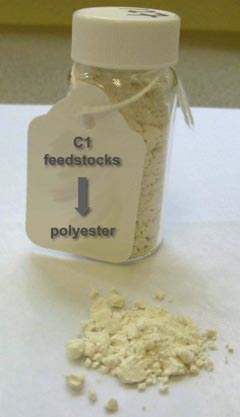AmericanChemicalSociety.com
- American Chemical Society
- Home
- Researcher Stories
Dr. Stephen Miller
 Associate Professor, Chemistry
Associate Professor, Chemistry
University of Florida
Grant 47951-AC7
Novel Utilization of C1 Feedstocks
to Create Commodity Plastics
Packaging is a $400 billion per year worldwide industry and is an important component of the $1.2 trillion worldwide plastics market. Vastly the most commonly-used plastics in the industry (99.8%) rely on petroleum-based feedstocks, which present challenges from a sustainability perspective.
The Miller Research Group, under the lead of Dr. Stephen A. Miller, is tackling work to develop a more sustainable solution for the packaging industry. His group continues to research alternatives to petroleum-derived plastics through the conversion of C1 feedstocks (e.g., methanol, carbon monoxide, and formaldehyde) to thermoplastics. Dr. Miller’s team has discovered a crucial method for preparing aliphatic polyesters directly from C1 feedstocks. The benefits of this process include a significant reduction in the number of steps to create the polymer as well as new methods to incorporate comonomers which allow control over the polymeric properties.
 Aliphatic polyesters can be directly synthesized from simple C1 feedstocks such as carbon monoxide and formaldehyde. The polymeric properties can be fine-tuned by incorporating an additional comonomer.
Aliphatic polyesters can be directly synthesized from simple C1 feedstocks such as carbon monoxide and formaldehyde. The polymeric properties can be fine-tuned by incorporating an additional comonomer.The most successful biorenewable plastic derives from polylactic acid (PLA) and is made from corn. This polymer is problematic both because it requires fermentation process to produce, and because it consumes a valuable food resource. PLA can also be problematic from a degradability standpoint. While it is technically biodegradable, to do so requires fairly stringent composting conditions (e.g., control of temperature, oxygen level, and mechanical action).
As a solution, Dr. Miller’s group is developing a polymer that is water degradable and does not require the addition of enzymes, organisms, or oxygen for degradation. This new class of polymer, called polyesteracetals, bears an acetal functional group in the polymer main-chain that is programmatically susceptible to hydrolysis. For obvious reasons, these sorts of plastics would not be suitable for long-term storage of liquids, but they would be ideal for dry packaging applications such as bread bags, blister packs, and shopping bags. Amazingly, this polymer takes less than a decade to degrade, whereas petroleum-based plastics take 1,000 years. Dr. Miller and his team have already won accolades for their work in this area, including the Cade Prize for Innovation.
When Dr. Miller applied for a PRF grant, his group was looking to develop a new kind of plastic. He credits the grant for enabling them to pursue this goal, as well as funding graduate student work that has been invaluable to the success of the project and led to the start up of their company, Florida Sustainables.
One day, Dr. Miller dreams of walking into stores and being able to point to a sustainable package that he helped develop. “Being able to make a large-scale polymer with an ecological benefit—one that’s a little better for the environment, while maintaining or even improving its properties—that inspires me.”
Dr. Stephen Miller has been an Associate Professor of Chemistry in the University of Florida’s Division of Organic Chemistry since 2007. Previously, he was an Assistant Professor at Texas A&M. He received his Ph.D. from the California Institute of Technology in 2000 and conducted post-doctorate research at the Massachusetts Institute of Technology.
Copyright © American Chemical Society

